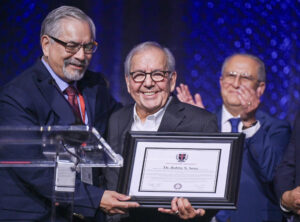
ATLANTA (BP)–President Clinton’s historic proclamation of a “Gay and Lesbian Pride Month” should be a basis for the Southern Baptist church of which he is a member to discipline him, SBC President Paige Patterson said on the eve of the convention’s annual meeting.
The proclamation, which was announced by the White House June 11, is “entirely inconsistent with [Clinton’s] confession as an evangelical Christian and certainly as a Southern Baptist,” Patterson said.
“I would call once again upon the church in which the president holds membership to take before them this proclamation that he has made at the White House and make it the subject of church discipline,” the SBC leader said. “The fact that he is the president of the United States ought to make no difference. When a member of a Southern Baptist church takes the position that he has taken in outright contradistinction to the Word of God, that church should act to bring about church discipline in that case.”
Clinton has been a member of Immanuel Baptist Church in Little Rock, Ark., since 1980, according to church records.
Immanuel pastor Rex Horne had not been unaware of the proclamation and declined to comment, a church staff member said June 15.
Patterson made his comments on “For Faith and Family,” the radio program of the Southern Baptist Ethics & Religious Liberty Commission. He responded after being informed of the proclamation by host Richard Land, ERLC president. Patterson did not mention Immanuel’s name on the program, which was broadcast from the Georgia Dome, site of the SBC’s June 15-16 convention.
The proclamation of June as Gay and Lesbian Pride Month is a first for a United States president, a White House spokesman confirmed. It was issued this month partly because the National Park Service recently added New York’s Stonewall Inn to the National Register of Historic Places. In June 1969, homosexuals at the bar resisted police action and gave birth to the homosexual rights movement in this country.
Saying in the proclamation he is proud of his administration’s achievements on homosexual rights, Clinton called on Americans to observe the month “with appropriate programs, ceremonies and activities that celebrate our diversity” and to recall the homosexual Americans whose “contributions have enriched our national life.”
The president’s proclamation is “in keeping with his own immorality, and it is further in keeping with his own dishonesty,” said Patterson, president of Southeastern Baptist Theological Seminary, Wake Forest, N.C. “For to state that he is a member of an evangelical church of any kind, let alone a Southern Baptist church, and make a proclamation recognizing as righteous and OK what God has called ungodly and unrighteousness is, to say the least, inconsistent.
“I would say that without question that 95 percent or better of Southern Baptists would be terribly against the position” espoused by the president, Patterson said.
Land told Baptist Press, “I’m shocked that the president of the United States would abuse the office of the presidency by issuing a proclamation proclaiming Gay and Lesbian Pride Month, when he knows that for tens of millions of Americans of religious conviction that homosexuality and lesbianism are condemned in the Scripture as a perversion that is contrary to God’s creation and God’s laws. It is one thing to call for toleration, but with the office of the White House, he is calling for affirmation.”
In a sermon to the SBC Pastors’ Conference June 14 after the radio program, Land said in reference to Clinton’s proclamation he knew what an “appropriate program” would be — “to pray that God will stay his judgment on this country until this man is no longer our president.”
Both Patterson and Land affirmed Christians are to love homosexuals.
Southern Baptists “love them, and God loves them. And if they will repent and come to Christ, he will change their lives,” Patterson said.
“We must distance [ourselves] from the sort of homosexual bashing that sometimes goes on,” he said. “We’re in the business of redemption, and that’s what we want to see accomplished. At the same time, we would like for our children and our grandchildren and our great-grandchildren to grow up in a country where they’re not constantly besieged by this.”
Patterson also affirmed that the SBC is not able, under its polity, to interfere in the practices of a local church.
Last year, Patterson was among those who supported a call by R. Albert Mohler Jr., president of Southern Baptist Theological Seminary in Louisville, Ky., for Immanuel to discipline the president. That request came after Clinton admitted in August he had been misleading in denying he had an adulterous relationship with Monica Lewinsky.
In September, ABC News reported Horne had talked to Clinton about his adultery with Lewinsky but the pastor did not intend to remove him from the church.
Immanuel, like many Southern Baptist churches, has not practiced discipline, including the removal of members, in recent decades. Immanuel has handled each moral transgression as a private matter between the individual and a minister, a staff member told BP.
The SBC has repeatedly spoken through the resolution process in opposition to homosexuality as an acceptable lifestyle. It also has addressed Clinton’s policies on the issue.
In 1993, the convention, responding to Clinton’s support of homosexual and abortion rights, passed a resolution separating itself from his policies. An attempt was made at the same meeting to prevent Immanuel’s messengers from being seated, but the credentials committee rejected the effort, ruling a church could not be held liable for the beliefs of a member.
At the 1998 meeting in Salt Lake City, messengers approved a resolution decrying a Clinton executive order issued the month before. His order added “sexual orientation” to the list of categories, such as race, gender and age, already protected against discrimination in the federal civilian workforce. With Clinton as president, most federal agencies and departments already had instituted policies providing job protection for homosexuals. The resolution opposed attempts to “provide government endorsement, sanction, recognition, acceptance or civil rights advantage on the basis of homosexuality.” A proposed amendment to the resolution called on Immanuel to discipline Clinton but it failed by a 52-48 percent vote. The church has no messengers at this year’s SBC annual meeting in Atlanta.
Clinton’s June 11 proclamation is the latest in a series of Clinton administration actions furthering homosexual rights.
A week before, Clinton announced the appointment of James Hormel as the United States’ first openly homosexual ambassador. The president made the appointment while Congress was in recess, thereby using a little-known constitutional provision to avoid the normal requirement of Senate confirmation. Senate opponents of Hormel’s nomination prevented a vote in the last Congress. Hormel, a frequent financial supporter to homosexual causes, will be ambassador to Luxembourg.
In April, Clinton affirmed his endorsement of a bill in Congress that would extend protection under hate-crimes legislation to “sexual orientation,” which includes homosexuality. Current law covers violent crimes motivated by bias based on color, national origin, race or religion. Clinton also announced a partnership between his administration and some private firms and organizations to teach tolerance programs, which will include homosexuality, in middle schools.
Only days after taking office in 1993, Clinton announced an attempt to overturn the ban on homosexuals in the military, but his effort was thwarted. He appointed a liaison to the homosexual community and has named several open homosexuals to posts in his administration. In 1997, he became the first president to speak at a homosexual rights event, when he addressed the national dinner of the Human Rights Campaign, the country’s largest homosexual political organization.
Clinton also has repeatedly affirmed his support for the Employment Non-discrimination Act, legislation that would make discrimination on the basis of “sexual orientation” illegal in both the public and private workforce.















